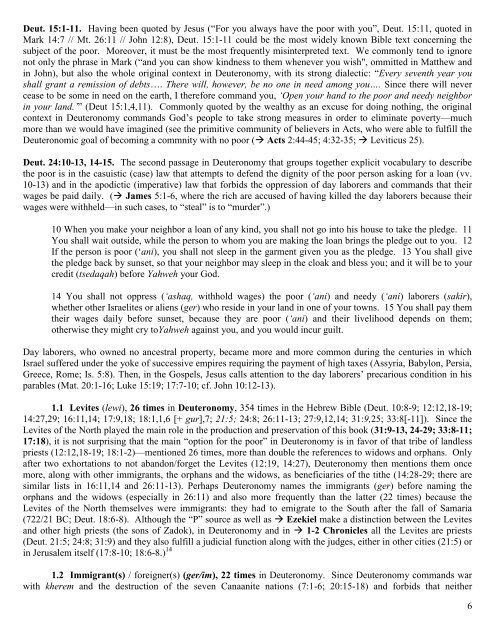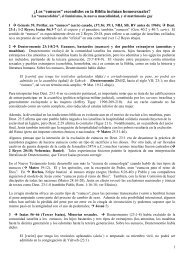Deuteronomy: - Fundación Otras Ovejas de Argentina
Deuteronomy: - Fundación Otras Ovejas de Argentina
Deuteronomy: - Fundación Otras Ovejas de Argentina
You also want an ePaper? Increase the reach of your titles
YUMPU automatically turns print PDFs into web optimized ePapers that Google loves.
Deut. 15:1-11. Having been quoted by Jesus (―For you always have the poor with you‖, Deut. 15:11, quoted in<br />
Mark 14:7 // Mt. 26:11 // John 12:8), Deut. 15:1-11 could be the most wi<strong>de</strong>ly known Bible text concerning the<br />
subject of the poor. Moreover, it must be the most frequently misinterpreted text. We commonly tend to ignore<br />
not only the phrase in Mark (―and you can show kindness to them whenever you wish", ommitted in Matthew and<br />
in John), but also the whole original context in <strong>Deuteronomy</strong>, with its strong dialectic: ―Every seventh year you<br />
shall grant a remission of <strong>de</strong>bts…. There will, however, be no one in need among you…. Since there will never<br />
cease to be some in need on the earth, I therefore command you, „Open your hand to the poor and needy neighbor<br />
in your land.‟‖ (Deut 15:1,4,11). Commonly quoted by the wealthy as an excuse for doing nothing, the original<br />
context in <strong>Deuteronomy</strong> commands God‘s people to take strong measures in or<strong>de</strong>r to eliminate poverty—much<br />
more than we would have imagined (see the primitive community of believers in Acts, who were able to fulfill the<br />
Deuteronomic goal of becoming a commnity with no poor (� Acts 2:44-45; 4:32-35; � Leviticus 25).<br />
Deut. 24:10-13, 14-15. The second passage in <strong>Deuteronomy</strong> that groups together explicit vocabulary to <strong>de</strong>scribe<br />
the poor is in the casuistic (case) law that attempts to <strong>de</strong>fend the dignity of the poor person asking for a loan (vv.<br />
10-13) and in the apodictic (imperative) law that forbids the oppression of day laborers and commands that their<br />
wages be paid daily. (� James 5:1-6, where the rich are accused of having killed the day laborers because their<br />
wages were withheld—in such cases, to ―steal‖ is to ―mur<strong>de</strong>r‖.)<br />
10 When you make your neighbor a loan of any kind, you shall not go into his house to take the pledge. 11<br />
You shall wait outsi<strong>de</strong>, while the person to whom you are making the loan brings the pledge out to you. 12<br />
If the person is poor (‗ani), you shall not sleep in the garment given you as the pledge. 13 You shall give<br />
the pledge back by sunset, so that your neighbor may sleep in the cloak and bless you; and it will be to your<br />
credit (tsedaqah) before Yahweh your God.<br />
14 You shall not oppress („ashaq, withhold wages) the poor („ani) and needy („ani) laborers (sakir),<br />
whether other Israelites or aliens (ger) who resi<strong>de</strong> in your land in one of your towns. 15 You shall pay them<br />
their wages daily before sunset, because they are poor („ani) and their livelihood <strong>de</strong>pends on them;<br />
otherwise they might cry toYahweh against you, and you would incur guilt.<br />
Day laborers, who owned no ancestral property, became more and more common during the centuries in which<br />
Israel suffered un<strong>de</strong>r the yoke of successive empires requiring the payment of high taxes (Assyria, Babylon, Persia,<br />
Greece, Rome; Is. 5:8). Then, in the Gospels, Jesus calls attention to the day laborers‘ precarious condition in his<br />
parables (Mat. 20:1-16; Luke 15:19; 17:7-10; cf. John 10:12-13).<br />
1.1 Levites (lewi), 26 times in <strong>Deuteronomy</strong>, 354 times in the Hebrew Bible (Deut. 10:8-9; 12:12,18-19;<br />
14:27,29; 16:11,14; 17:9,18; 18:1,1,6 [+ gur],7; 21:5; 24:8; 26:11-13; 27:9,12,14; 31:9,25; 33:8[-11]). Since the<br />
Levites of the North played the main role in the production and preservation of this book (31:9-13, 24-29; 33:8-11;<br />
17:18), it is not surprising that the main ―option for the poor‖ in <strong>Deuteronomy</strong> is in favor of that tribe of landless<br />
priests (12:12,18-19; 18:1-2)—mentioned 26 times, more than double the references to widows and orphans. Only<br />
after two exhortations to not abandon/forget the Levites (12:19, 14:27), <strong>Deuteronomy</strong> then mentions them once<br />
more, along with other immigrants, the orphans and the widows, as beneficiaries of the tithe (14:28-29; there are<br />
similar lists in 16:11,14 and 26:11-13). Perhaps <strong>Deuteronomy</strong> names the immigrants (ger) before naming the<br />
orphans and the widows (especially in 26:11) and also more frequently than the latter (22 times) because the<br />
Levites of the North themselves were immigrants: they had to emigrate to the South after the fall of Samaria<br />
(722/21 BC; Deut. 18:6-8). Although the ―P‖ source as well as � Ezekiel make a distinction between the Levites<br />
and other high priests (the sons of Zadok), in <strong>Deuteronomy</strong> and in � 1-2 Chronicles all the Levites are priests<br />
(Deut. 21:5; 24:8; 31:9) and they also fulfill a judicial function along with the judges, either in other cities (21:5) or<br />
in Jerusalem itself (17:8-10; 18:6-8.) 14<br />
1.2 Immigrant(s) / foreigner(s) (ger/im), 22 times in <strong>Deuteronomy</strong>. Since <strong>Deuteronomy</strong> commands war<br />
with kherem and the <strong>de</strong>struction of the seven Canaanite nations (7:1-6; 20:15-18) and forbids that neither<br />
6

















